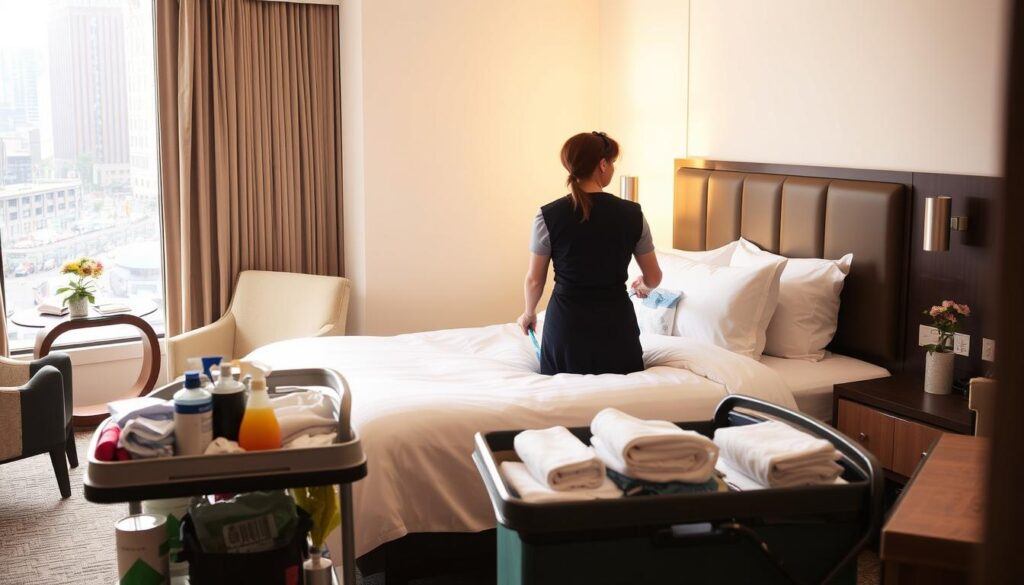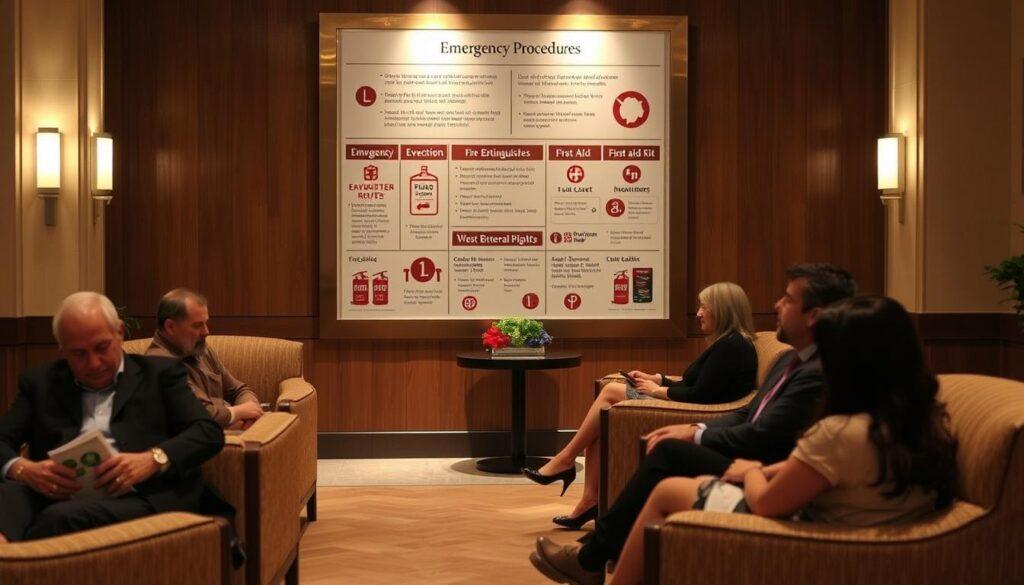In the fast-paced world of hospitality, consistency and efficiency are key. Top hotels use Standard Operating Procedures (SOPs), checklists, and job descriptions. These tools help team members perform at their best.
Managing a boutique property or a large resort? Mastering these tools can improve your service quality and increase profits. A detailed hotel operations manual is vital for guiding your team. It ensures smooth day-to-day operations.
With a well-structured operations manual, you can enhance your management skills. This will drive success in your hospitality business. Download our “Hotel Operating Manual” to start.
Key Takeaways
- Understand the importance of SOPs in hospitality management
- Learn how to create effective checklists for your team
- Discover the benefits of a detailed operations manual
- Improve your service quality and boost your bottom line
- Elevate your hotel management skills with expert guidance
The Foundation of Successful Hotel Management
Standardized hotel operational procedures are key for a consistent guest experience and efficient operation. By using hotel standard operating procedures, your hotel can run smoothly. This ensures a high-quality experience for your guests.
Why Standardized Procedures Matter in Hospitality
Standardized procedures are essential for a successful hotel. They keep all departments consistent, making sure every guest interaction is positive and memorable.
Consistency in Guest Experience
Consistency is vital for a loyal customer base. With well-documented hotel management best practices, every guest gets the same level of service. This doesn’t matter which department they interact with.
Operational Efficiency and Cost Control
Standardized procedures also improve operations, reduce waste, and control costs. This is done through:
- Clear guidelines for staff on daily tasks and responsibilities
- Regular training and evaluation to ensure compliance with procedures
- Continuous monitoring and improvement of operational processes
The Impact of Well-Documented Operations on Guest Satisfaction
Well-documented operations directly impact guest satisfaction. When staff follows established procedures, guests have a better experience. This can lead to positive reviews, repeat business, and a strong reputation.
What Is a Hotel Operations Manual for Managers
A hotel operations manual is key for managers. It outlines how to run a hotel smoothly. It helps managers keep service consistent and follow hotel rules.
Definition and Core Components
This manual covers front office, housekeeping, food and beverage, and maintenance. It tells staff what they need to do and what’s expected of them.
It includes:
- Standard operating procedures (SOPs) for various departments
- Policies and guidelines for staff behavior and guest interaction
- Emergency procedures and crisis management protocols
- Performance standards and evaluation criteria
How a Complete Manual Changes Daily Operations
A good operations manual makes daily hotel work better. It helps departments talk better and trains new staff faster.
Streamlining Communication Across Departments
A single document helps departments work together better. It makes sure everyone knows their part and the goal.
Reducing Training Time for New Staff
New staff learn fast with a clear manual. They know what to do right away. This means better service for guests sooner.
| Department | Key Procedures | Responsible Staff |
|---|---|---|
| Front Office | Check-in, check-out, guest services | Front desk staff, concierge |
| Housekeeping | Room cleaning, linen supply, public area maintenance | Housekeeping staff, supervisors |
| Food and Beverage | Food preparation, service standards, inventory management | Chefs, servers, bartenders, F&B managers |
Key Differences Between Operations Manuals and Training Guides
Operations manuals and training guides are both important. But they’re for different things. Manuals cover ongoing operations and policies. Guides teach new staff specific tasks and skills.
Essential Sections Every Hotel Operations Manual Should Include
To keep your hotel running smoothly, your operations manual needs key sections. These cover front office, housekeeping, food and beverage, and maintenance. A detailed manual standardizes processes, boosts efficiency, and improves guest satisfaction. It sets a solid foundation for your hotel’s daily operations.
Front Office and Reservation Procedures
The front office is where guests first meet your team. It’s important to have clear procedures for check-in and check-out, handling complaints, and managing reservations. This ensures a great start for your guests.
Housekeeping Standards and Protocols
Keeping high housekeeping standards is key for guest happiness and loyalty. Your manual should detail cleaning protocols, linen management, and public area upkeep. This ensures your housekeeping services are consistent.
Food and Beverage Service Guidelines
If your hotel has a dining area, clear food and beverage guidelines are essential. These include kitchen safety, service standards, and inventory management. Documenting these helps maintain quality service and reduces mistakes.
Maintenance and Facility Management Procedures
Regular maintenance keeps guests comfortable and safe. Your manual should outline maintenance schedules, facility inspections, and how to handle facility-related guest complaints. This keeps your hotel in top shape.
Kiragu Ngucuga’s Hotel Operating Manual Framework
Kiragu Ngucuga’s framework provides a structured way to create your hotel operations manual. It covers all key areas of hotel management. Using this framework ensures your manual is thorough and guides your staff effectively.
| Department | Key Procedures | Benefits |
|---|---|---|
| Front Office | Check-in/check-out, guest complaints handling | Improved guest satisfaction, streamlined processes |
| Housekeeping | Room cleaning protocols, linen management | Consistent cleanliness, reduced errors |
| Food and Beverage | Kitchen safety, service standards, inventory management | Enhanced service quality, minimized waste |
| Maintenance | Maintenance schedules, facility inspections | Well-maintained facilities, reduced downtime |
Creating Effective Standard Operating Procedures (SOPs)
Hotel managers need to create effective Standard Operating Procedures (SOPs) for consistency and excellence. SOPs guide staff through tasks and ensure high-quality service. They are the backbone of hotel operations.
SOP Structure and Formatting Best Practices
To make effective SOPs, follow best practices in structure and formatting. Use clear headings, concise language, and a logical flow. Consistency is key for easy understanding.
Step-by-Step Process for Developing Clear SOPs
Creating clear SOPs involves several steps:
- Identify the process or task to be documented
- Gather information from relevant staff members
- Outline the steps involved in the process
- Review and refine the SOP for clarity and accuracy
- Test the SOP to ensure it is effective in practice
Examples of Well-Crafted Hotel Management SOPs
Effective SOPs are seen in various hotel operations. For example, a Room Service Delivery Protocol outlines steps for taking orders, preparing food, and delivering it. Another example is a Lost and Found Procedure, detailing how to handle lost items and return them to owners.
Room Service Delivery Protocol
| Step | Description | Responsible Staff |
|---|---|---|
| 1 | Take room service order | Front Desk/Order Taker |
| 2 | Prepare food according to order | Kitchen Staff |
| 3 | Deliver food to guest’s room | Room Service Staff |
Lost and Found Procedure
A well-structured Lost and Found Procedure ensures lost items are handled efficiently. It includes logging found items, storing them securely, and contacting owners.
Front Office Operations: SOP Examples and Best Practices
In the hospitality world, a well-run front office is vital. It sets the tone for a guest’s visit and builds loyalty. As the first point of contact, it’s key to delivering top-notch service and making stays memorable.
Check-in and Check-out Procedures
Smooth check-in and check-out are essential. Standardized steps can make these processes quicker, improving the guest experience. This means having a clear check-in, using mobile check-in, and training staff well.
Handling Guest Complaints and Special Requests
Dealing with complaints well is key to guest happiness. Front office staff should listen, empathize, and solve problems fast. Having clear steps for complaints and special requests makes guests feel important.
Managing Reservations and Room Assignments
Managing reservations and room assignments well boosts occupancy and revenue. It’s about keeping records right, using yield management, and matching rooms to guest needs. This way, hotels can please guests more and earn more.
Upselling Techniques and Protocols
Upselling can increase revenue if done right. Staff should know how to offer upgrades and extra services. They should also know how to match offers to what each guest wants.
VIP Guest Handling Procedures
Exceptional service for VIP guests builds loyalty and repeat visits. Hotels should have special plans for VIPs, like personalized check-in and extra services. This makes a big impression and encourages good word-of-mouth.
Housekeeping Excellence: Operational Guidelines
Keeping your hotel spotless is key to a great guest experience. Good housekeeping makes your place welcoming and boosts guest happiness. It also helps your hotel’s reputation.
Room Cleaning and Inspection Standards
Your hotel needs strict cleaning and check-up rules. This means:
- Thorough dusting and sanitizing of all surfaces
- Changing linens and towels on time
- Looking for any damage or problems in rooms
Deep Cleaning Schedules and Checklists
Deep cleaning is vital for your housekeeping. Create a plan for tasks like:
- Carpet shampooing
- Upholstery cleaning
- Dusting of ceiling fans and air vents
Quality Control Measures
Quality checks are essential for consistent service. You can do this by:
- Housekeeping supervisors doing regular checks
- Listening to what guests say
- Training housekeeping staff all the time
Inventory Management and Supply Procedures
Managing your supplies well is important for smooth housekeeping. Make sure your team:
- Checks supplies often
- Uses a good supply chain for everything
- Follows a first-in, first-out system

Public Area Maintenance Protocols
Cleaning public areas is as important as guest rooms. Create plans for:
- Lobby and hallway cleaning
- Pool and gym upkeep
- Keeping restrooms clean and stocked
Following these steps will help you achieve top housekeeping. It will also make your hotel a better place for guests.
Food and Beverage Department: Critical SOPs
To keep your hotel’s food and beverage service top-notch, you need clear SOPs. Good SOPs make guests happy and help your team work better. This means less money spent and more done.
Kitchen Safety and Sanitation Procedures
Keeping the kitchen clean and safe is key. This means regular cleaning, right food storage, and training on hygiene. Having a HACCP plan helps a lot in avoiding food sickness.
Service Standards for Different Dining Venues
Every dining spot in your hotel needs its own service style. For example, fancy restaurants need formal service, while casual spots are more relaxed. Setting clear service rules for each place ensures great guest experiences everywhere.
Inventory Control and Cost Management
Managing your inventory well is key to saving money. This includes:
- Regular stock checks
- Talking to suppliers to get better deals
- Reducing waste
Portion Control Guidelines
Using portion control helps control food costs. Train your team to measure ingredients right and keep serving sizes the same.
Waste Reduction Strategies
Less waste means less money spent and helps the planet. Ways to do this include:
- Keeping an eye on inventory to avoid too much
- Finding new uses for leftover food
- Composting food waste when you can
Emergency and Crisis Management Procedures
In the hospitality world, being ready for emergencies is key. It keeps guests safe and your hotel’s good name intact. Good emergency and crisis plans are vital for unexpected events.
Medical Emergency Response Protocols
A solid medical emergency plan is essential. You need trained staff and the right gear like defibrillators. Your hotel should know how to call for help and give first aid until help gets there.
Natural Disaster Preparedness
Natural disasters can strike without warning. Being ready is critical. Your hotel should have a plan for disasters, including how to evacuate and communicate. Staff should also get regular training.

Security Breach and Theft Handling
Security issues can harm guest safety and trust. Strong security steps, like CCTV and secure keys, help. Your team should know how to handle security problems.
Guest Safety Procedures
Keeping guests safe is top priority. This means not just reacting to emergencies but preventing them too. Your hotel should check safety often, train staff, and tell guests about safety steps.
With good emergency and crisis plans, you can keep your guests safe. This protects them and your hotel’s reputation.
Implementing Your Hotel Operations Manual
To put a hotel operations manual into action, you need a solid plan. This plan should cover training, checking up on staff, and always looking to get better.
Training Staff on New Procedures
Good training is key to making it work. Your training manual should teach staff about the new rules. You can do this with:
- Role-playing and practical exercises to simulate real-world scenarios
- An assessment and certification process to ensure staff competency
Role-Playing and Practical Exercises
Role-playing helps staff get used to new rules in a safe way. It lets them practice dealing with guest issues, handling reservations, and more.
Assessment and Certification Process
After training, check if staff get it and certify them if they do. This makes sure everyone meets the same standards.
Monitoring Compliance and Performance
After training, watching how staff follow the rules is important. Regular checks and reviews help spot where more training is needed.
Continuous Improvement Strategies
To keep your manual useful, you must always look to improve. This means:
- Feedback collection methods to identify areas for improvement
- Regular review and update schedules to ensure the manual stays current
Feedback Collection Methods
Getting feedback from staff and guests is a great way to find ways to get better. Use surveys, comment cards, or regular meetings for this.
Regular Review and Update Schedules
Having a set time to review your manual keeps it fresh and in line with the latest practices.
Conclusion: Elevating Your Hotel Management with Standardized Operations
Effective hotel management depends on standardized operations, as shown in your hotel operations handbook. By following hotel management best practices SOP, you ensure consistency and excellence. This boosts guest satisfaction and loyalty.
Your hotel management guidelines should cover all hotel operations. This includes front office procedures, housekeeping standards, and food and beverage service. A well-structured hotel operations manual streamlines operations, reduces errors, and boosts efficiency.
To improve your hotel management, focus on creating and following standardized procedures. This aligns with industry best practices. It will enhance your hotel’s performance and give you a competitive edge. By following the strategies in this article, you can elevate your hotel management and achieve long-term success.

